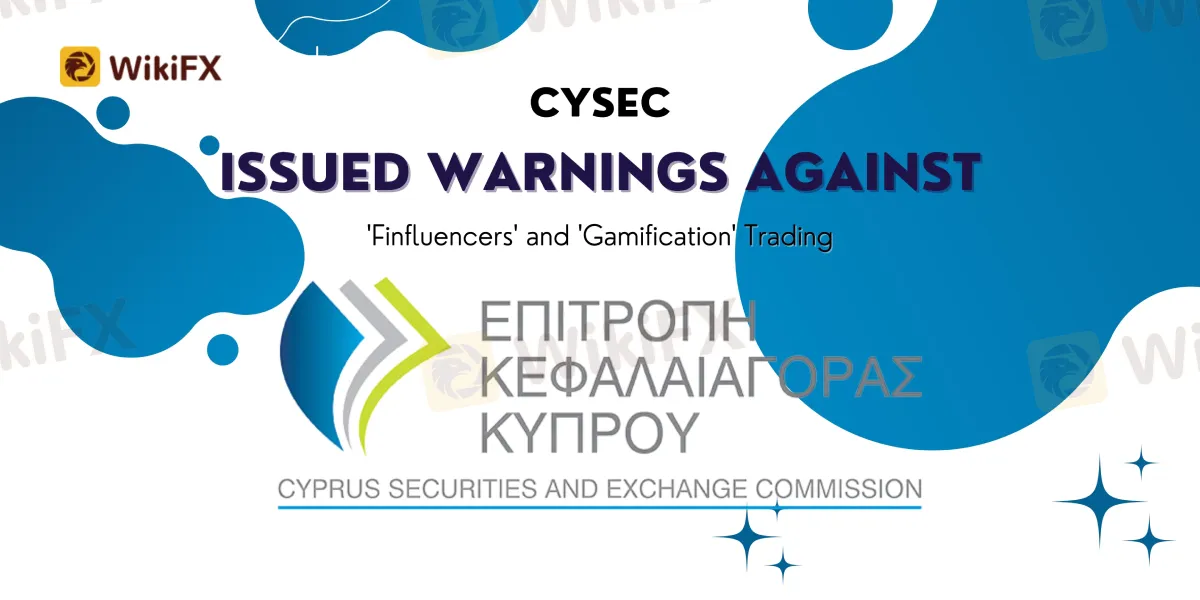简体中文
繁體中文
English
Pусский
日本語
ภาษาไทย
Tiếng Việt
Bahasa Indonesia
Español
हिन्दी
Filippiiniläinen
Français
Deutsch
Português
Türkçe
한국어
العربية
CySEC Issued Warnings Against 'Finfluencers' and 'Gamification' Trading
Abstract:"CySEC is worried about the increased involvement of younger, inexperienced investors, as well as the proliferation of information on social media and internet platforms promoting sophisticated goods that are not necessarily what they seem," said Dr. George Theocharides, Chairman of CySEC.

The regulator started an education campaign for investors.
Several other authorities issued similar warnings earlier.
An investor protection campaign was started on Tuesday by the Cyprus Securities and Exchange Commission (CySEC) to address the growing worldwide epidemic of investment harm. The campaign's purpose is to caution investors against making investing choices based on emotional and social pressure rather than logical thinking and market expertise.
The effort, according to the regulator, is in reaction to the advertising of sophisticated and dangerous financial products on social media networks. It also mentioned celebrities promoting cryptocurrency items more often.

“CySEC is worried about the increased involvement of younger, inexperienced investors, as well as the proliferation of information on social media and internet platforms promoting sophisticated goods that are not necessarily what they seem,” said Dr. George Theocharides, Chairman of CySEC.
The regulator also said that many investors are uninformed of the specifics of these dangerous investment products.
Financial literacy among young people is diminishing, which has increased the chance that they would not completely comprehend the distinctive features and hazards associated with trading in these instruments, according to Dr. Theocharides.
Trading Gamification
Furthermore, CySEC expressed worry about retail assets becoming 'gamified.' It is the latest financial market watchdog to issue a warning about such approaches, as numerous other CySEC equivalents are closely scrutinizing the negative effects of such tactics and potential limitations.
However, the Mediterranean island's watchdog did not indicate whether it intends to take any action against such 'gamification of investment' practices.
To follow more on latest news on the go, download the WikiFX App for free from App Store and on Google Play Store.

Disclaimer:
The views in this article only represent the author's personal views, and do not constitute investment advice on this platform. This platform does not guarantee the accuracy, completeness and timeliness of the information in the article, and will not be liable for any loss caused by the use of or reliance on the information in the article.
Read more

The Ultimate Guide to Automated Forex Trading in 2025
Modern markets are revolutionized by automated trading systems, which now execute 70-85% of all transactions. These advanced automated trading software solutions, commonly called trading robots or Expert Advisors (EAs), leverage algorithmic precision for automatic trading across forex, stocks, and commodities 24/7. By removing emotional interference and executing trades in microseconds, auto forex trading platforms create fair opportunities for all market participants. For those new to automated trading for beginners, these systems provide disciplined, backtested strategies while significantly reducing manual effort.

Will natural disasters have an impact on the forex market?
The forex market is known for its rapid responses to global events, but the influence of natural disasters, such as earthquakes and typhoons, can be less straightforward. While headlines may scream about catastrophic damage and economic disruption, the long-term effects on currency values often depend on a blend of immediate shock and underlying economic fundamentals.

Philippines Deports 29 Indonesians Linked to Online Scam Syndicate in Manila
Online scam groups in the Philippines trick Filipinos into gambling and love scams, from Manila to Bacolod, causing trafficking and pain as police fight back.

Why does your mood hinder you from getting the maximum return from an investment?
Investment decisions are rarely made in a vacuum. Aside from the objective data and market trends, our emotions—and our overall mood—play a crucial role in shaping our financial outcomes. Whether you’re feeling overconfident after a win or anxious after a loss, these emotional states can skew your decision-making process, ultimately affecting your investment returns.
WikiFX Broker
Latest News
How Crypto Trading Transforms FX and CFD Brokerage Industry
UK would not hesitate to retaliate against US tariffs - No 10 sources
FCA Warns Against 10 Unlicensed or Clone Firms
CySEC Warns Against 14 Unlicensed Investment Websites
Top Currency Pairs to Watch for Profit This Week - March 31, 2025
Will natural disasters have an impact on the forex market?
Philippines Deports 29 Indonesians Linked to Online Scam Syndicate in Manila
Navigating the Intersection of Forex Markets, AI Technology, and Fintech
Exposed: Deceptive World of Fake Trading Gurus – Don’t Get Fooled!
AI-Powered Strategies to Improve Profits in Forex Trading
Currency Calculator







